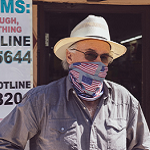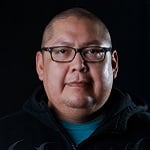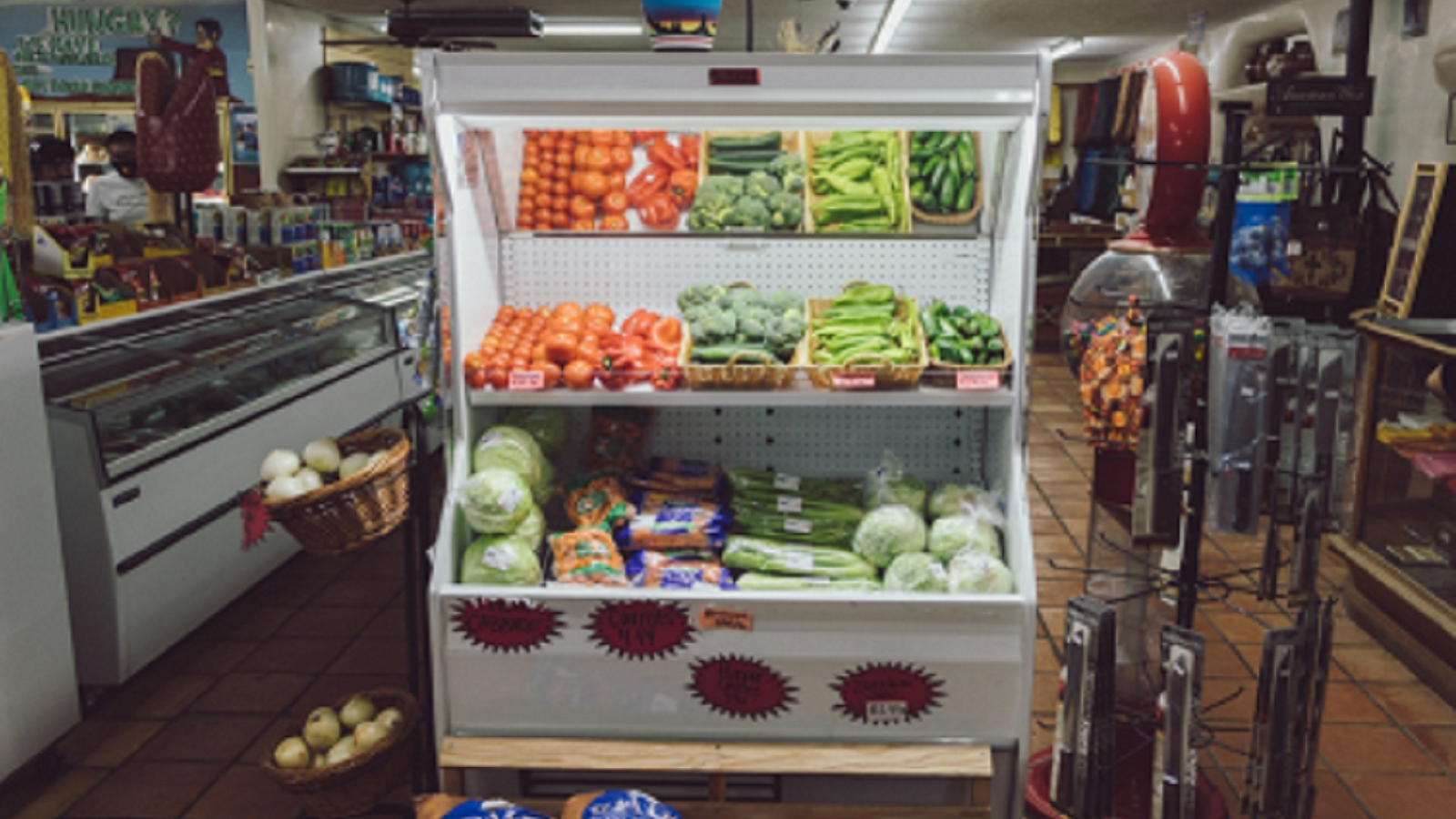It’s a calm sunny day as I sit with John McCulloch in front of his store in Teec Nos Pos, Arizona. The store has served his community since 1905. The English name Teec Nos Pos is derived from the Navajo T'iisnasbas, a name inspired by a grove of trees growing in a circle in the area. As we sit and talk, community members file in and out of the store. They’re greeted with large florescent posters asking customers to wear a mask while in the store, to stay home if they feel sick, and to respect the maximum occupancy level of eight people in the store at one time.
“Do you feel the community is thankful for the availability of fruits and vegetables provided here?” I ask.
“Oh yeah, big time! Big time! We sell more groceries now than we’ve ever sold,” exclaims McCulloch.
The Teec Nos Pos Trading Post, located in Teec Nos Pos, Arizona, is one of 34 stores on the Navajo Nation currently participating in the Healthy Navajo Store Initiative program through Community Outreach and Patient Empowerment (COPE), a Native-led non-profit based in Gallup, New Mexico. COPE has been working with the Navajo Nation to strengthen food sovereignty and promote a return to healthy eating through collaborations with local clinics, growers, schools, and small stores. An important aim of the Healthy Navajo Store Initiative is to assist stores in increasing availability of fresh fruits and vegetables—a need that has only deepened throughout the COVID-19 pandemic.
“The availability of vegetables has increased our overall sales,” says McCulloch. “It brings people into the store.”
It has been eight months since the COVID-19 outbreak began, and stores have been adapting to the new normal. Navajo Nation was hit particularly hard by COVID-19 and had the highest per capita infection rate in the United States in May 2020. The public health measures that have since been put in place by the Navajo government have helped to flatten the curve on Navajo Nation.
Stores on the Navajo Nation responded quickly to guidelines from Navajo leadership, though this often required investing their own limited funds. Stores erected sneeze guards, procured gloves and masks for employees, and used up cleaning supplies at much faster rates than usual. Recognizing these crucial needs, COPE worked with stores to help provide support with personal protective equipment (PPE), hand sanitizer stations, and cleaning supplies. What happened next surprised store owners like McCulloch:
We’re considered an essential business because of the groceries and fuel we sell here. Our business and sales increased, particularly in the beginnings of the COVID experience… Our local customers have spent more money here compared to where they normally would.
And these increased grocery sales include the fresh fruits and vegetables that are part of the Navajo Fruit and Vegetable Prescription Program. This program provides vouchers to families with young children that can be exchanged for fruits, vegetables, and traditional foods. McCulloch states:
I think the Fruit and Vegetable Prescription program through COPE has been very important in changing taste and awareness of better foods, and people have changed their perspective on what they buy, you know? I think COPE has been instrumental in their efforts to promote better diet with fruits and vegetables.
For several months, the Navajo Nation implemented lockdowns and curfews to minimize contact and viral transmission. And McCulloch explains:
I think [the Navajo people] feel more comfortable here than in a Walmart situation where they might feel they’re more at risk of catching the virus. I feel they’re more comfortable coming to a small store than being in big crowds.
While the Healthy Navajo Store Initiative continues to work with stores on the Navajo Nation to increase the availability of fresh fruits and vegetables, it helps to have an ambassador like John McCulloch who connects on a personal level with his customers and understands his role in maintaining the health of the community. I thank John for his time as we both stand up to shake hands… then we stop just before the clutch… instead, a nod and a smile. Many stores on the Navajo Nation have experienced their own accounts of the COVID pandemic, but all stay vigilant, support their employees, and continue providing fresh, healthy foods to their community, supporting each other throughout this difficult time.
**Feature photo provided and used with permission from Aditi Sethi, COPE Program Development Officer
Interested in other articles like this? Subscribe to our bi-weekly newsletter

John McCulloch is owner of the Teec Nos Pos Trading Post in Teec Nos Pos, Arizona. After working as a jeweler and in the oil fields of the North Sea, John came to Teec Nos Pos in 1994 with the intention to revitalize the store, preserve its identity as a trading post, and continue to be a community resource by providing access to healthy fruits and vegetables, water, fuel, and traditional foods. The store also purchases local items like piñon nuts, wool, mohair, Navajo rugs, and Navajo jewelry to help the local economy.
 Robert Alsburg is Program Coordinator for the Healthy Navajo Store Initiative program through Community Outreach and Patient Empowerment (COPE), a Native-led non-profit based in Gallup, New Mexico. Robert’s clans are To’ahani, Tsinsikaadnii, Bit’ahniií, and Tachii’niii. Robert joined COPE because of its deep involvement with many initiatives on the Navajo Nation regarding community health, as well as COPE's understanding that solutions can be found within the community itself. He hopes to continue serving communities on the Navajo Nation, improving processes surrounding food acquisition/availability, and building awareness around food sovereignty initiatives within Indigenous communities.
Robert Alsburg is Program Coordinator for the Healthy Navajo Store Initiative program through Community Outreach and Patient Empowerment (COPE), a Native-led non-profit based in Gallup, New Mexico. Robert’s clans are To’ahani, Tsinsikaadnii, Bit’ahniií, and Tachii’niii. Robert joined COPE because of its deep involvement with many initiatives on the Navajo Nation regarding community health, as well as COPE's understanding that solutions can be found within the community itself. He hopes to continue serving communities on the Navajo Nation, improving processes surrounding food acquisition/availability, and building awareness around food sovereignty initiatives within Indigenous communities.
- Share
-
Permalink


